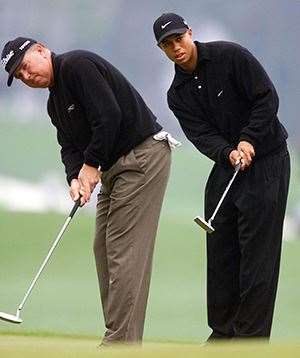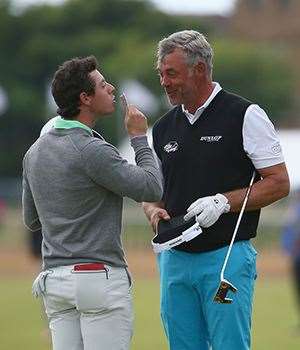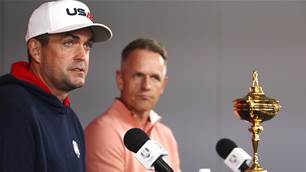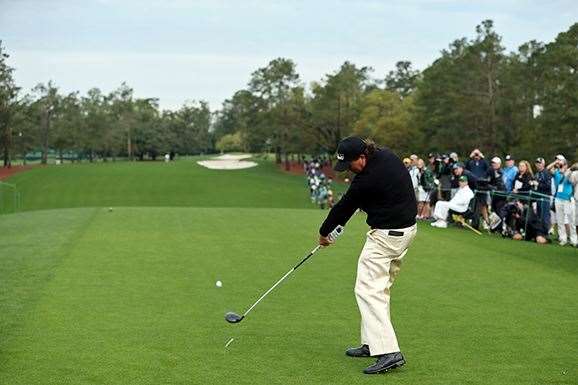There's more to winning than beating practice balls, according to Geoff Ogilvy. Real improvement comes from playing with those who are better than you are.
I hear this argument a lot. Which I suppose is not so surprising given the levels of prizemoney we pros get to play for these days. But still, to contend that guys at top of the game don’t win very often because they are lazy, spoiled or complacent is not an observation I can completely agree with.
A direct connection between “too much” money and only a few wins is too simplistic. It does work, up to a point. But it also defeats itself. Elite players all have so much money it cannot possibly be a major part of their thinking on the course. In terms of cash, it doesn’t matter where they finish. So it follows that winning must be their biggest motivation.
The guy who plays most aggressively – Phil Mickelson – has won more tournaments than anyone other than Tiger Woods over the past 25 years. Phil quite obviously plays to win and has earned huge amounts of money doing so. But the victories more than the cheques will give him the greater satisfaction.
OK, so Phil may not be a definitive example. I’m sure there are guys who see playing the Tour as a way to earn a living more than a way of making history. But guys like that existed when there was a lot less money to play for. So that is nothing new.
Having said that, there are more than a few current players who do seem to have trouble winning. They are almost perfect golfers in almost every way. They have great techniques. Their Trackman numbers are off the charts. Their equipment is perfectly fitted to their swings. They hit great shots. They are physically fit. And for the first three rounds of tournaments they are better than their predecessors ever were. Yet those same guys just don’t win as often as you might think they should. It’s puzzling.
There has to be more to this. Especially when you look at guys who used to win a lot but now don’t do so. If you can win, you can always win. These guys have proven they have the combination of technique and ‘bottle’ to get it done, but for whatever reason their ability to do so has diminished. It’s odd, particularly when they are, in so many ways, better players than they were when they were winning.
I have a theory as to why this weird phenomenon exists. Why is it we now seem to have more good players and fewer winners? Because nobody practices winning any more. Hardly anyone is out there on Tuesdays of tournament weeks playing money matches. I wonder about that. Yes, PGA Tour Commissioner Tim Finchem frowns upon the gambling aspect, but that isn’t really the reason. Instead of going head-to-head with someone, the vast majority of guys are out there hitting balls on the range, or working on their swings even when they are playing 18. It’s about hitting as many shots as they can rather than playing golf. It’s practice on the course.
I can think of fewer than ten guys on Tour who want to play for money, which is daft. They are the only ones who are actually playing golf. The rest of us simply move our range games to the course. We are not, for example, challenging each other on or around the greens – “I bet you $100 I can get this one up and down.” So there is no competitive aspect to practice. Many guys are out there by themselves with only their technology and their coaches for company. All of which makes them amazing golfers. But what it does not seem to do is make them winners, which makes sense – it is the only thing they are not practising.
 Mark O'Meara's two majors, both won when aged 41, can perhaps be attributed to his constant exposure to Tiger Woods in his prime. PHOTO: Getty Images.
Mark O'Meara's two majors, both won when aged 41, can perhaps be attributed to his constant exposure to Tiger Woods in his prime. PHOTO: Getty Images.I bet Phil shakes his head at what he sees others doing. He will not go on the course unless there is a game or a bet. And during that game there are all kinds of other games – longest drives and nearest the pin. It is constant competition because he doesn’t see the point, otherwise. Plus, if he does want to work on his swing, he goes to the range – where he works as hard as anyone on Tour.
From what I understand, that scenario was pretty much followed by Tiger when he was living at Isleworth in Florida, just up the road from Mark O’Meara. They would play every day for money amid hitting balls on the range. Can it be a coincidence that Mark, who had a pretty good career to that point, won two majors relatively late? I think not. He got better because he was competing with the best player on the planet on an almost daily basis.
Growing up, I was the same as Phil. If there was someone to play with, I wasn’t beating balls. I was involved in putting comps, or chipping, or out on the course playing a match. That’s all I ever did. I never saw the point in anything else. If two people are out there they need to be trying to beat each other. For me at least, pennant golf was a great preparation for what lay ahead. There is no better way to get your competitive juices going than in head-to-head matchplay. When the alternative to winning is ‘losing’ (rather than finishing fifth) it tends to get your attention. No one likes to lose. I know I don’t.
Subconsciously or not, I have moved away from that early philosophy. Take my putting. I have struggled on the greens for the past three years or so, despite working hard on my technique and all the rest of it. But what I should have been doing was finding a really good putter to play against every day. Had I done that, I think I would, today, be putting as well as I ever have.
I’ve done the same sort of thing with other aspects of my game. Anyone watching me at events over the past two or three years would have found me camped out at the range most of the time, which has to be part of what I do. But I’ve overdone it. I became a golfer who became great at hitting the ball when it doesn’t matter where it goes.
Look, we all want to hit the ball better. But I want to hit the ball better on the 18th hole, or the 16th hole, in the final round. In other words, when it really matters. Think about it. Hitting the ball better is merely a means to an end and that end is winning.
A quick look at my career backs up my theory. Every time I stepped up in standard, it was because I won a tournament. And every time I moved up I got better because I had to. Ultimately, of course, those who compete at the highest level – in majors and World Golf Championships – are better than those who don’t. It’s not because they hit the ball better; it’s because they are competing at a higher level. It’s the competition that provides the separation. Improvement comes from playing with those who are better than you are and who will challenge you to reach their level.
 Despite the generation gap, Northern Ireland duo Darren Clarke and World No.1 Rory McIlroy love taking a few dollars from each other in a practice round. PHOTO: Getty Images.
Despite the generation gap, Northern Ireland duo Darren Clarke and World No.1 Rory McIlroy love taking a few dollars from each other in a practice round. PHOTO: Getty Images.It’s my view that Tuesday matches at tournaments should be encouraged. If you go along two days before an event, what do you want to watch? Guys hitting three balls on every hole? Or would you rather follow Phil and Keegan Bradley against two other guys with some cash on the line? It’s a no-brainer. Not only are the players providing entertainment, they are making each other better.
In a way, I wish I had more exposure to young Aussie players like Ryan Ruffels, Todd Sinnott and Lucas Herbert. I’d love to be out there with them for practice rounds. It would make them better to play with me and it would make me play better to beat them. I would have to. They would be up for it every day. It’s the ideal practice plan, one I’m going to try to follow on and off Tour this year. I know that playing ‘Tour-style’ practice rounds is not the way to go.
There’s plenty of evidence to back me up. David Toms has played better the past couple of years because his kids are into golf and he plays with them. Paul Lawrie made the 2012 European Ryder Cup side in his early 40s, largely because his two sons dragged him out to play nearly every day and, more importantly, were keen to beat him.
So high-stress competition within practice is the ideal scenario. It engages the brain automatically, way more than yet another meaningless shot on the range does. At least for me, that’s what real golf is all about, not making perfect swings or hitting perfect shots. It’s obvious, but competition has to be the best way to prepare for competition. Now I just have to do it.
Related Articles

Column: The Sandbelt never lies

Under the radar into contention: Si Woo’s scintillating Australian Open Saturday














